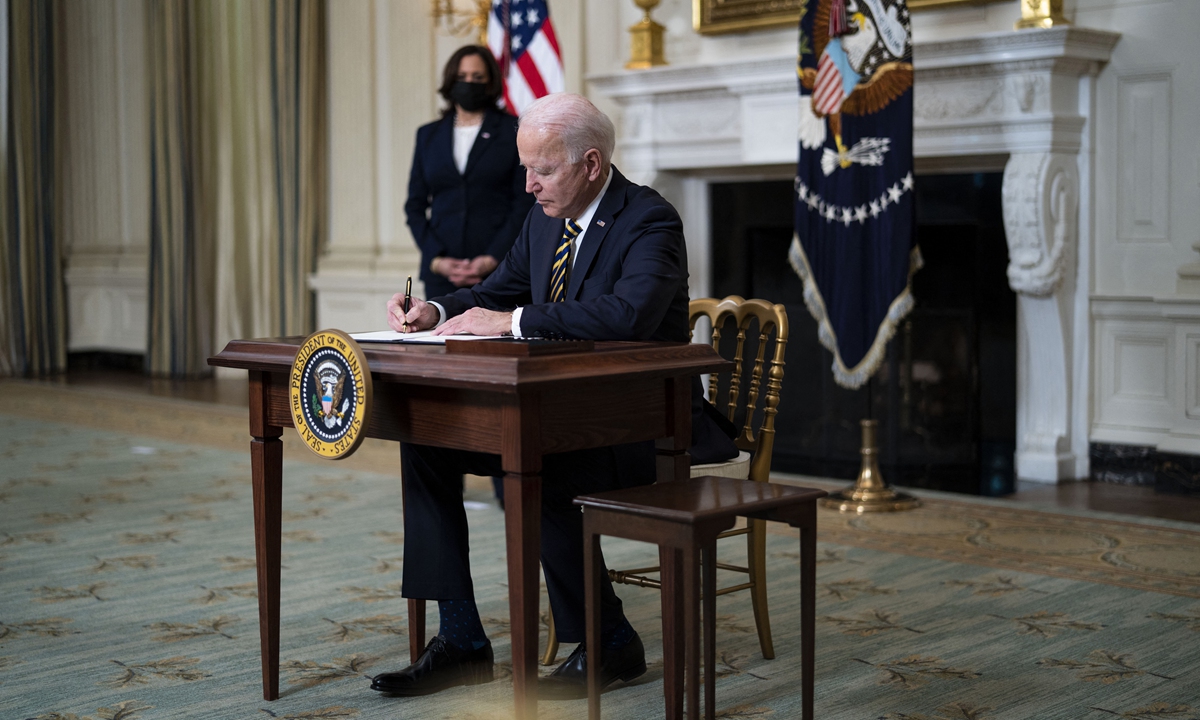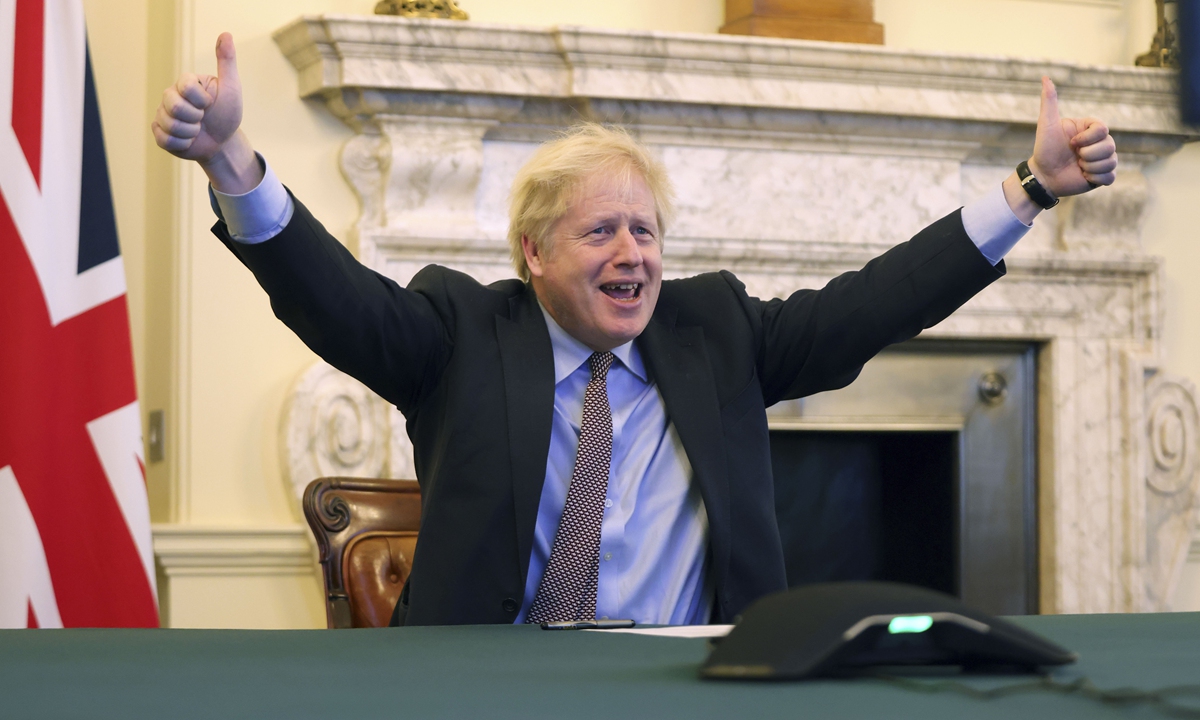It also showed that the leaders of those Western countries may have to "do something" to respond to rising anti-China voices in their own countries as Beijing hit back resolutely against unilateral sanctions over Xinjiang and so-called human rights issue. The suggestion to unify those "democratic states" without any realistic approach can only be seen as tough rhetoric rather than concrete action, according to experts.
Biden suggested to Johnson in a phone call on Friday that "democratic countries" should have a similar program to rival China's BRI to help communities around the world without giving further details, according to media reports. The UK Prime Minister, who welcomed the suggestion, talked about the ways toward alleviation programs to offset the level of dependency on China through the initiative, Politico reported on Saturday, citing an unnamed politician who attended the meeting at 10 Downing Street. Also, Johnson revealed that he and Biden had agreed during their Friday call to funnel hundreds of millions of pounds behind the program, according to British media reports.
The idea came after Biden said on Thursday he would prevent China from passing the United States to become the most powerful country in the world, Reuters reported.
Johnson appeared to be the first leader of the Western countries that imposed sanctions on Chinese individuals and entities over Xinjiang lately in voicing the support for Biden's infrastructure plan. However, Johnson was also the one who spoke highly of the BRI years ago, and such an ambivalent attitude, as some Chinese experts said, reflected the lack of long-term understanding and mature strategies on a rising China.

US President Joe Biden signs an Executive Order on the economy in the White House. Photo: AFP
Feasibility in question
This was not the first time that the US administration took aim at the BRI, seeing it as a geopolitical game changer in challenging a US-led world order, which, however, is an incorrect understanding about the initiative, Wang Yiwei, director of the Centre for European Studies at the Renmin University of China, told the Global Times on Sunday.
"What is the BRI that China has proposed? It's about building infrastructure projects together and sharing the benefits of those projects, during which all parties can be involved, including developed countries and third-party markets, and the ultimate goal is for development, to share the benefits stemming from such development," Wang said, noting that a benefit-driven initiative, rather than a decoupling fueled by geopolitics that incurs huge losses, can be accepted by many.
Mutual beneficial intentions also explain why some major allies of Washington, for example, Italy, have already ignored the smear from Biden's predecessor and joined the initiative in 2019, and leaders of some EU member countries like Hungarian Prime Minister Viktor Orban, openly supported the BRI, seeing it as "an opportunity" rather than a "threat."
Even Johnson himself had expressed enthusiasm about the BRI in the beginning, saying the UK would continue to be the most open market for China in Europe, meanwhile, British finance minister Philip Hammond had called it having great potential for spreading prosperity and sustainable development, according to media reports in 2019.
It is not surprising to see the UK respond to the call for the so-called infrastructure program for democratic states so eagerly as the country has no "burden" to showcase its close relationship with the US since it did not reach a deal with China in joining the BRI initiative, Cui Hongjian, director of the Department of European Studies at the China Institute of International Studies, told the Global Times on Sunday.
"By dancing to the tune of the US, Boris Johnson wants to prove that although the UK exited from the EU, the country could still have a chance to be the No.2 power in the West," Cui said. "Joining the plan to rival China's BRI is his alternative to the previous D10 club, which turned out to be not as successful as they thought it would be."
For Biden, such a plan reflects some US politicians' ambition to counter China amid fears over its rise, experts said, as they try to prevent China from becoming stronger. However, it remains difficult to push forward such a vague idea to counter China geopolitically as there are splits inside the West's bloc, or specifically, the allies of Washington, Wang said, noting that some EU leaders would be cautious in adopting tough rhetoric or action against China from the perspective of their own interests.
German Chancellor Angela Merkel, for instance, said recently that the EU has much in common with the US however differs on China policy, German news outlet Deutsche Welle reported on Friday. The EU would share "no identity" with Washington on Beijing, which is absolutely clear.
As of January 30, 2021, China has signed in total 205 cooperation documents with 140 countries and 31 international organizations, according to the official website of the BRI. And the multilateral organization the World Bank has also come up with evaluations about BRI economic influence on trade, transport, investments and so on, forecasting that if it's fully implemented, BRI transport projects could increase global trade between 1.7 and 6.2 percent, increasing global real income by 0.7 to 2.9 percent.
When the Trump administration raised the idea of Blue Dot Network, mainly pushed by the US and its allies in the Asia-Pacific including Japan and Australia to counter the BRI alternative years ago, some Western media and observers already questioned the feasibility and practicality of the proposal.

British Prime Minister Boris Johnson celebrates the agreement between the UK and the EU at his office in London on Thursday. Britain said on the same day that an agreement had been secured on the country's future relationship with the European Union, after last-gasp talks just days before a cliff-edge deadline. Photo: Xinhua
'Have-to-do' gesture
However, some Chinese experts saw that the only reason of bringing up another similar scheme at the moment was leaders from the US-led Western bloc have to respond with a tough stance against Beijing's resolute countermeasures to the latest sanctions over Xinjiang, as a gesture of catering to their domestic political pressure while defending their so-called "democratic values" to score political points from their supporters.
China on Friday hit back after the UK's unilateral move to sanction Chinese individuals and entities over Xinjiang affairs, using counter-sanctions against nine UK individuals and four entities including the chairman of the foreign affairs committee Tom Tugendhat, and other MPs and scholars who have spread rumors about China's Xinjiang region, including also some major think tanks that have played an infamous role in the matter.
Soon after, Beijing announced to sanction US and Canadian officials as well as one Canadian entity on Saturday night, resolutely fighting against the latest sanctions imposed by the two countries on China. US officials such as Gayle Manchin, Chair of the United States Commission on International Religious Freedom (USCIRF) and Tony Perkins, Vice Chair of the USCIRF, in addition to Michael Chong, Member of Parliament of Canada, and the Subcommittee on International Human Rights of the Standing Committee on Foreign Affairs and International Development of the House of Commons of Canada are all on the sanctions list.
The US is still using so-called common values to draw in Europe so that it can politicize economic issues to force European countries to take a side, however, time will prove that "European countries will eventually realize that they cannot feed their citizens with values unless the US actually is willing to cut some 'flesh' of its own," Cui said.
The so-called infrastructure program will only be a mere piece of scrap paper, or a tactic to create an atmosphere, as the US is facing serious domestic economic problems and will not make substantial investment in its alliances, such as cancelling tariffs, transferring technology and making a concession on digital tax, he noted.
"The big blueprint that the US is drawing for its alliances will fall through eventually as the foundation of common values is fragile," Cui added.
"tactic" - Google News
March 28, 2021 at 11:53PM
https://ift.tt/3rEbTN7
Biden's infrastructure plan for democratic countries a 'tactic' to lure allies with values - Global Times
"tactic" - Google News
https://ift.tt/2NLbO9d
Shoes Man Tutorial
Pos News Update
Meme Update
Korean Entertainment News
Japan News Update
Bagikan Berita Ini














0 Response to "Biden's infrastructure plan for democratic countries a 'tactic' to lure allies with values - Global Times"
Post a Comment